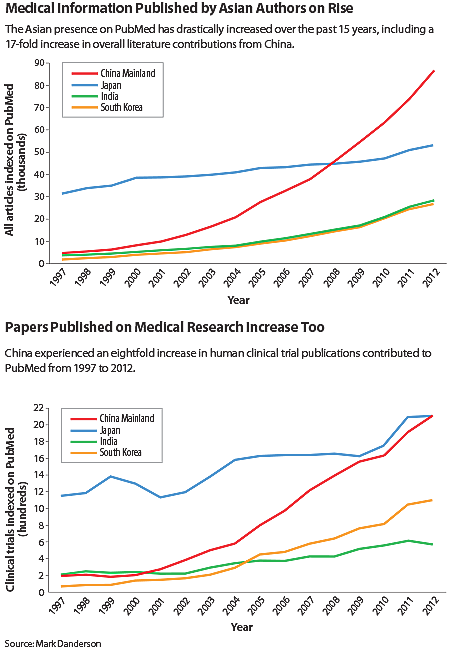Since the May implementation of China’s first national legislation on mental health care (Psychiatric News, May 31), Chinese clinician scientists are strategizing on how to get the word out to their international colleagues about their advances in psychiatric research.
Michael Roy, executive editor of the American Journal of Psychiatry (AJP), recently traveled to the Peking University Institute of Mental Health in Beijing to meet with mental health researchers on how to get their study reports published in AJP.
“There is already a lot of mental health research going on in China,” Roy told Psychiatric News. “The new law opened doors for more modern practices, in terms of psychiatric research. Chinese researchers are now really pushing to publish more in Western journals.”
Currently, the top journals for psychiatric research in terms of impact factor are dominated by American and European publishing companies. AJP ranks second—behind Nature Publishing Group’s Molecular Psychiatry. Roy explained that getting published in AJP could greatly advance a scientist’s career and noted that Chinese researchers are aware of this.
In 2008, the National Science Foundation (NSF) reported that Asians make up one-third of the 5.8 million researchers worldwide and that one-fourth of all scientific publications come from Asian countries. Within a 12-year period, China’s scientific publishing rate alone has increased approximately 20 percent, whereas the rate for Western countries has increased by an average of only 1.3 percent.
Overall, human clinical trials conducted in China have increased eightfold in the past 15 years. The NSF projected that China’ scientific and medical publishing output will overtake that of the United States by the end of this year.
“A lot more psychiatric research [from China] is forthcoming,” commented Roy. “To not strike an early partnership with researchers from China is folly for any medical journal.”
The executive editor of the Chinese Mental Health Journal, Zhang Wei-Hua, M.D., told Psychiatric News that he learned a lot about how AJP deals with submitted papers from the talk Roy gave in Beijing. Zhang explained that language makes it difficult to publish in AJP or any other American journal. “Though a lot of us can speak English freely, only a few Chinese psychiatrists can write in English fluently.”
Over the past 18 months, AJP received 99 manuscripts from China and accepted six, which is comparable to the overall acceptance rate for all submissions, according to Roy.
“There is a perception that North American journals have a bias against international submissions—this is just not true. . .and statistics show it,” he explained.
Roy wanted authors worldwide to know that a rejection is not “slamming the door” for getting published in AJP. He said that even AJP editors have had submissions rejected. “Even if AJP rejects your paper, we will make sure that you know why,” he tells authors whose work has been rejected. “We will work with you. And if you come back following the instructions we have given, success for future manuscripts will definitely come your way.”
Roy’s trip was sponsored by the China Medical Tribune. ■

